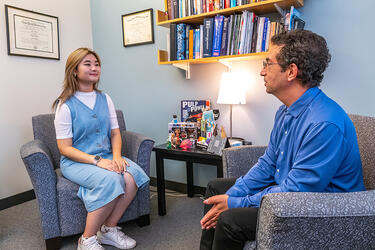
Urgent Care
MIT Health’s Urgent Care Service is open M–F, 8 a.m. – 8 p.m. and weekends 10 a.m. – 4 p.m. Use Clockwise MD to reserve your place in line.
Sleep resources
Can’t get to sleep? Find print and audio downloads to help you overcome insomnia, reduce stress, and improve sleep quality.
Ask Our Digital Navigator
Need to schedule an appointment? Have a question about our services? Our friendly Digital Navigator is here to help.
Student Mental Health at MIT
When should you give us a call? What can we do? Learn how MIT Health’s Student Mental Health & Counseling Services can help you.



